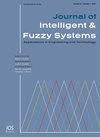Big data clustering using fuzzy based energy efficient clustering and MobileNet V2
IF 1
4区 计算机科学
Q3 COMPUTER SCIENCE, ARTIFICIAL INTELLIGENCE
引用次数: 0
Abstract
Big data analytics (BDA) is a systematic way to analyze and detect various patterns, relationships, and trends in vast amounts of data. Big data analysis and processing require significant effort, techniques, and equipment. The Hadoop framework software uses the MapReduce approach to do large-scale data analysis using parallel processing in order to generate results as soon as possible. Due to the traditional algorithm’s longer execution time and difficulty in processing big amounts of data, this is one of the main issues. Clusters are highly correlated inside each other but are not highly correlated with one another. The technique of effectively allocating limited resources is known as an optimization algorithm for clustering. For processing large amounts of data with several dimensions, the conventional optimization approach is insufficient. By using a fuzzy method, this can be prevented. In this paper, we proposed Fuzzy based energy efficient clustering approach to enhance the clustering mechanism. In summary, Fuzzy based energy efficient clustering introduces a function that measures the distance between the cluster center and the instance, which aids in improved clustering, and we then present the MobileNet V2 model to improve efficiency and speed up computation. To enhance the method’s performance and reduce its time complexity, the distributed database simulates the shared memory space and parallelizes on the MapReduce framework on the Hadoop cloud computing platform. The proposed approach is evaluated using performance metrics such as Accuracy, Precision, Adjusted Rand Index (ARI), Recall, F1-Score, and Normalized Mutual Information (NMI). The experimental findings indicate that the proposed approach outperforms the existing techniques in terms of clustering accuracy.基于模糊高效聚类和MobileNet V2的大数据聚类
大数据分析(BDA)是一种在大量数据中分析和检测各种模式、关系和趋势的系统方法。大数据分析和处理需要大量的工作、技术和设备。Hadoop框架软件采用MapReduce方法,采用并行处理的方式进行大规模数据分析,以便尽快生成结果。由于传统算法的执行时间较长,难以处理大量数据,这是主要问题之一。集群内部是高度相关的,但彼此之间不是高度相关的。有效分配有限资源的技术被称为聚类的优化算法。对于处理大量多维数据,传统的优化方法是不够的。通过使用模糊方法,可以防止这种情况。本文提出了基于模糊的节能聚类方法来增强聚类机制。综上所述,基于模糊的节能聚类引入了一个测量聚类中心与实例之间距离的函数,这有助于改进聚类,然后我们提出了MobileNet V2模型来提高效率和加快计算速度。为了提高该方法的性能并降低其时间复杂度,分布式数据库在Hadoop云计算平台上模拟共享内存空间并在MapReduce框架上并行化。采用准确性、精密度、调整兰德指数(ARI)、召回率、F1-Score和标准化互信息(NMI)等性能指标对所提出的方法进行评估。实验结果表明,该方法在聚类精度方面优于现有的聚类方法。
本文章由计算机程序翻译,如有差异,请以英文原文为准。
求助全文
约1分钟内获得全文
求助全文
来源期刊

Journal of Intelligent & Fuzzy Systems
工程技术-计算机:人工智能
CiteScore
3.40
自引率
10.00%
发文量
965
审稿时长
5.1 months
期刊介绍:
The purpose of the Journal of Intelligent & Fuzzy Systems: Applications in Engineering and Technology is to foster advancements of knowledge and help disseminate results concerning recent applications and case studies in the areas of fuzzy logic, intelligent systems, and web-based applications among working professionals and professionals in education and research, covering a broad cross-section of technical disciplines.
 求助内容:
求助内容: 应助结果提醒方式:
应助结果提醒方式:


